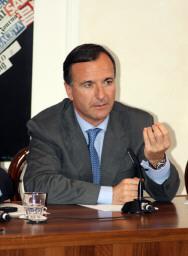Foreign Minister Franco Frattini on Monday hailed the launch of the Union for the Mediterranean here as ''an important event'' but stressed the need for action to back up union members' good intentions.
Frattini told Italian state Radio 1 that he particularly welcomed Syrian President Bashar al-Assad's address, in which Assad said United States participation in the Middle East peace process was welcome.
''Assad's intention to enter into discussions with the US and Europe means distancing Damascus from Iran, which is our objective,'' he said. ''Now we expect action from Syria''.
Underlining that Italy has ''always had a fine relationship'' with Syria, Lebanon, Israel and Egypt, Frattini said Italy's role was to ''put to good use its capacity for understanding and assessment'' which he added was equal ''to very few other countries''.
The minister said he hoped the union would also make inroads into curbing illegal immigration in the region.
''Everyone understands that the management of immigration must involve the whole of the Mediterranean,'' he said.
He called for special cooperation from Libya, which has observer status in the union, and which with almost 800 kilometres of coastline has become a key stepping-stone for African migrants seeking to enter Europe, most of them through Malta and Sicily.
Also here on Monday, Italian Premier Silvio Berlusconi met Israeli counterpart Ehud Olmert on the sidelines of the Mediterranean Union summit and said he was ''more optimistic than in the past'' about prospects for peace.
The idea of a Mediterranean union, the brainchild of French President Nicolas Sarkozy who first touted the idea during his presidential campaign, has enjoyed enthusiastic backing from Italy from the outset. Frattini said earlier this month that the union was ''a good leap forward in political quality'' from the 1995 Barcelona Process, a Euro-Mediterranean partnership that failed to meet many of its targets.
The union, which joins EU states with other countries on the Mediterranean's north African and Middle Eastern shores, will focus on areas such as improving energy supplies, boosting maritime surveillance, fighting terrorism and creating a shared scientific community.









